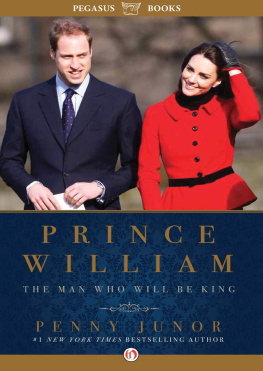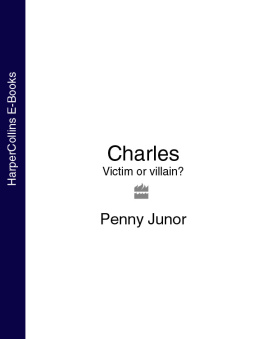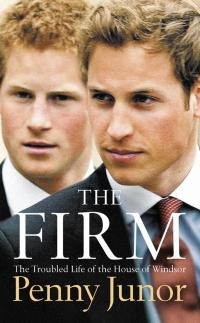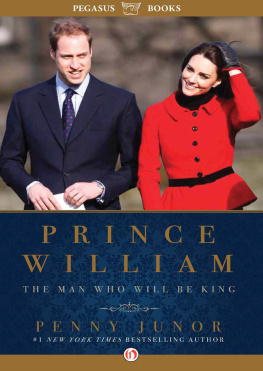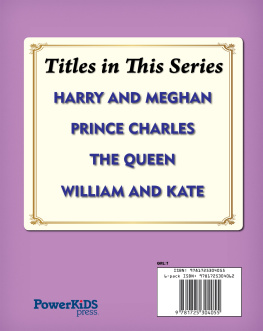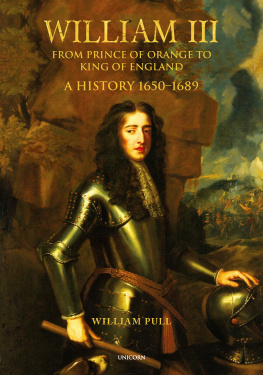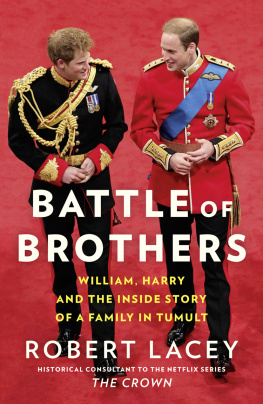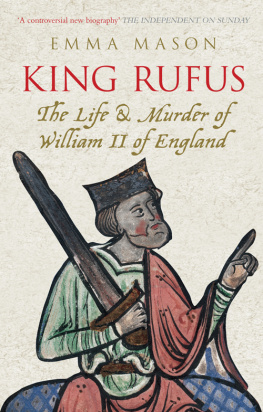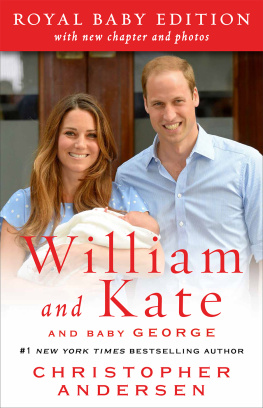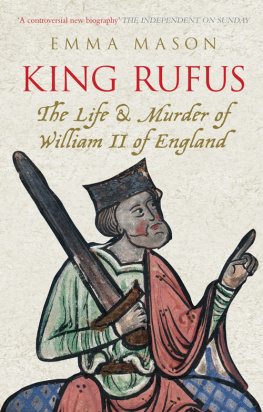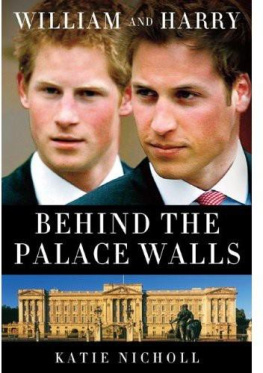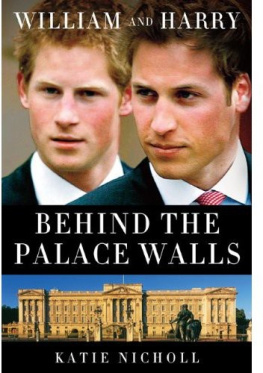PRINCE WILLIAM
THE MAN WHO WILL BE KING
PENNY JUNOR

PEGASUS BOOKS
NEW YORK LONDON
For Marlene, Max and Oscar
CONTENTS
INTRODUCTION
His mother was an icon, the Peoples Princess, whose shocking, violent and early death plunged the nation into grief that bordered on hysteria and brought the monarchy perilously close to the end of the road. His father is one of the most controversial figures of the age and the man who will one day be King. Having written biographies about both the Prince and Princess of Wales, and followed them on and off for the last thirty years, the opportunity to write about their eldest son, Prince William, was irresistible. I find him one of the most interesting, remarkable and, whatever ones view of the monarchy, important young men of his generation. One day he will inherit the throne of the United Kingdom. He will be Head of State, Supreme Governor of the Church of England, Colonel-in-Chief of the Armed Forces, and possibly Head of the Commonwealth. His face will be on our coins and our stamps; he will have little power but incalculable influence; he will represent the nation to itself and be the ultimate symbol of stability in a world of rapid change.
Although he is second in line to the throne, and may not accede for a couple of decades or more, this character is key to ensuring the institution has a long-term future. The Queen, his grandmother, celebrating her Diamond Jubilee, has been a remarkable sovereign and is deservedly and universally loved and admired. Sadly, the same cannot be said for the Prince of Wales. The very public breakdown of his marriage and subsequent remarriage to the woman Diana blamed for her unhappiness, divided the nation and undermined almost everything the Prince had achieved in the last forty years. He has worked relentlessly to improve life for the less privileged in our society and to ensure that the earth is a safe and sustainable place for future generations. His dedication to duty has been unflinching but his approval rating among the public has never fully recovered.
Opinion polls commissioned by newspapers asking whether the throne should skip a generation when the Queen dies suggest that a high percentage of the population would favour this outcome. According to these polls some people go further and think the Queen should abdicate so William could inherit the throne while he is young. These proposals are as realistic as fantasy football and fail entirely to understand how hereditary monarchy works. As the old refrain so aptly runs, The King is dead, long live the King, and when the Queen does come to the end of her life and, therefore, her reign, her son and heir, Charles, will become King, provided he is sane and fit when the time comes. Any engineering of the system is out of the question.
I happen to believe he will be a very good King and I hope that public opinion will change. He has had bad press for most of his adult life and been unfairly judged. However, he will always be a man whose lifestyle and interests are far removed from those of the general public. This was not a problem sixty years ago when his mother came to the throne, although she is considerably less extravagant than Charles. But ours is a different and far less forgiving age. Deference and respect for all our institutions, not just the monarchy, has long gone. Usefulness and value for money have become all important. If it is to survive in the long term, the monarchy needs to be relevant and in tune with ordinary people. Paradoxically, Charles is very much in tune with the man in the street, more so than most politicians, and has a natural rapport with young and old, rich and poor though this isnt the general perception. As the former Prime Minister Sir John Major says, The most important thing for the monarchy is that they arent seen to be curious creatures drafted in from Planet Windsor and who have nothing in common with and no relevance to the way most people live their lives.
William, with his less plummy voice, chinos and easy, jocular manner, is someone they can immediately relate to. He has more of his father in him than you might think, but also plenty of his mothers impish humour and warmth. He also has the advantage of an almost normal upbringing, which his father never had. He knows how the rest of us live, knows what its like to get cash out of a hole-in-the-wall, peel potatoes and cook coq au vin. His father wouldnt know where to begin.
William plays polo and follows rich mens pursuits, but he also loves rugby and football and plays a mean game of pool. Theres no denying hes privileged and that most of his friends are wealthy, but he wears it very lightly; there is no trace of the arrogance that so often goes with the public school, hunting, shooting and fishing set. He is remarkably humble for a man in his position, modest and self-deprecating laughing at himself is not only an endearing trait but also a very effective icebreaker when talking to strangers. And in our celebrity, body-perfect, youth-obsessed age, he ticks all the boxes.
He is also Dianas son. That alone makes him special. For so many people she was the beautiful fairytale Princess, the angel of mercy who, despite her own suffering and sadness, reached out and gave solace to others. They loved her with an alarming intensity, and they love the son who keeps alive her looks and so many of her mannerisms.
The first fairytale had an unhappy ending. Now there is a new Princess and a new story. Catherine Middleton is reminiscent of Diana, and shes another gift for the fashion industry, but she has the advantage of a stable background and a good education; and, unlike Diana, she had a long, hard look at the bizarre world William inhabits before agreeing to join him there. This love story is the genuine article, and William knows that it cant disappoint. This union must be as solid, supportive and companionable as his grandparents marriage.
If you want to understand William, says one of his friends, his relationship with the Middletons is the beginning and end of it. He likes them, theyre happy and theyre nice, straightforward people. And the fact that they are not blue-blooded is a bonus. For too long the Royal Family has been associated with the aristocracy and the upper classes.
William is fiercely protective of Kate. He saw what happened to his mother and has seen the pain and torment his father has suffered by attempting to be open and honest. He will not make the same mistakes. He is determined to keep his private life private, as his grandmother has done. He will give his time, his talents, his energy and his enthusiasm to the country, but he wont give his soul. His father allowed work and duty to all but take over his life. William will make sure he keeps enough time aside for himself and for his family.
This steely determination to create the life he wants, and to be in control of it, is possibly the most noticeable effect of his home life as a child. While the world pruriently read about the War of the Waleses in newspapers and magazines, he lived through it. The woman killed so tragically, whom millions mourned, was his mother. As one of his friends says: Imagine what it must have been like to live through the s**t of his childhood: the divorce, the acrimony, the shame of it all being played out in public, his mothers Panorama interview, then shes dead. His fathers mistress hanging around, then moving in. It makes you shudder. Even if you were living on a sink estate, youd feel sorry for your neighbour if theyd gone through that.
What is interesting is how he came through it so apparently unscathed. If home

